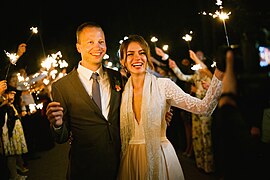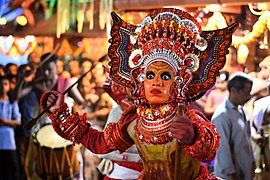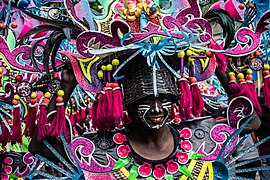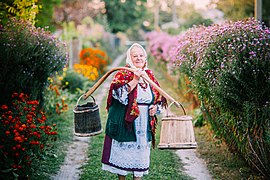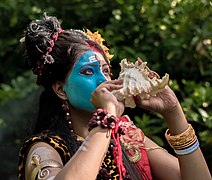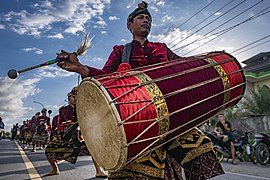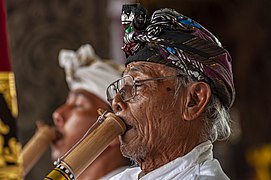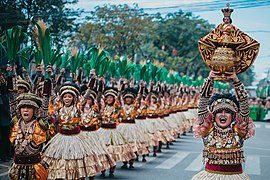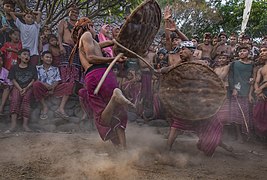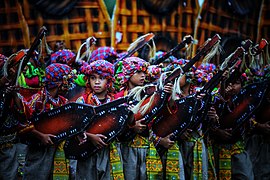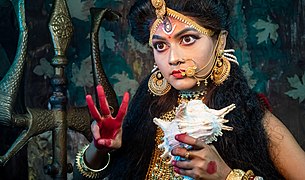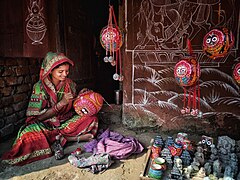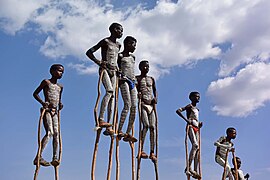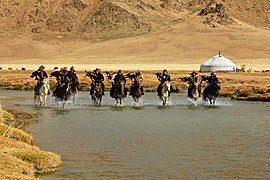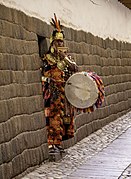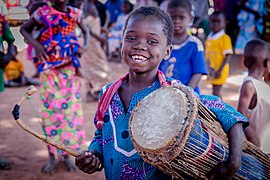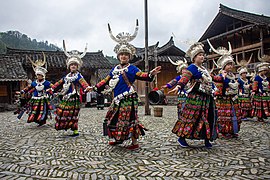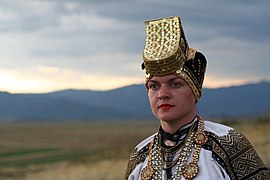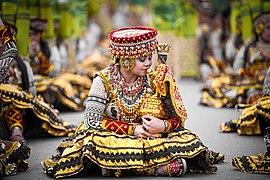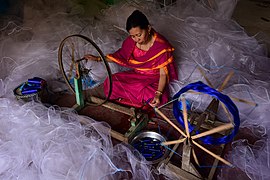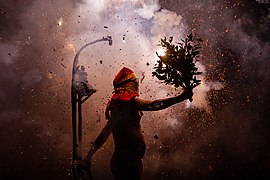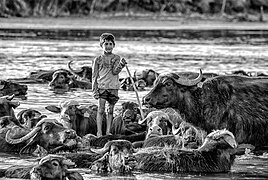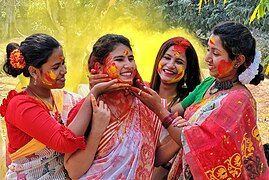Commons:ویکی دوستدار فرهنگ عامه

ویکی دوستدار فولکلور (WLF) مسابقه عکاسی بینالمللی است که در آن عکاسان میتوانند عکس، ویدیو و صدا دربارهٔ فرهنگ محلی را تحت مجوزهای رایگان در ویکیانبار به اشتراک بگذارند تا در ویکیپدیا و سایر موارد استفاده شود. این مسابقه عکاسی با تمرکز بر فرهنگ عامیانه مناطق مختلف از جمله رقصهای محلی، موسیقی محلی، فعالیتهای محلی، بازیهای عامیانه، غذاهای محلی، لباسهای محلی، فولکلور و سنت از جمله تصنیف، افسانهها، آواز و رقص سنتی، نمایشهای عامیانه، بازیها، رویدادهای فصلی، آداب و رسوم تقویم، هنرهای عامیانه، باورهای عامیانه، اساطیر و غیره برگزار میشود. هدف این پویش حفاظت از میراث فرهنگی ناملموس جهان است.
The Wiki Loves Folklore International photography contest serves as a vital catalyst for preserving intangible cultural heritage, in accordance with the 2003 UNESCO Convention. It encourages people from diverse backgrounds to capture and share images representing their cultural heritage, effectively documenting and sharing these intangible aspects of culture. Through visual storytelling, it raises awareness about the importance of cultural practices, rituals, and traditions and promotes community engagement in heritage preservation. By showcasing intangible cultural heritage on Wikimedia Commons, Wiki Loves Folklore ensures its transmission to future generations, making it more accessible and relevant in the modern world while upholding the principles of the 2003 UNESCO Convention.
Every year, the Wiki Loves Folklore photography contest runs from February 1st to March 31st. Originally globally launched in 2019 as "Wiki Loves Love", the contest was subsequently renamed to "Wiki Loves Folklore." Over its 5-year journey, the contest has garnered an impressive collection of 79,844 media files from 168 different countries, with the invaluable contribution of 6,414 dedicated volunteers.
Editions
- عوام: ویکی فولکلور را دوست دارد 2024, the contest in February and March 2024
- Commons:ویکی دوستدار فرهنگ عامه ۲۰۲۳, the contest in February 2023 (images)
- Commons:Wiki Loves Folklore 2022, the contest in February 2022 (images)
- Commons:ویکی دوستدار فولکلور ۲۰۲۱, the contest in February 2021 (images)
- Commons:ویکی دوستدار فرهنگ عامه, the contest in February 2020 (images)
- Commons: ویکی عاشق عشق ۲۰۱۹, the contest in February 2019 (images)
Winning pictures in former editions
Our Partners
Wiki Loves Folklore is a project organized by the Open Heritage Foundation. We express our thanks to the Wikimedia Foundation along with Wikimedia Espana, Wikimedia Russia, Wikimedia Thailand, Wikimedia Peru, Wikimedia Community Kenya, Wikimedia Belgium, Wikimedia France, Wikimedia Deutschland, Wikimedia of Benin Usergroup, Dagbani Wikimedians, Wikimedia Community of Tatar language User Group, Wikimedians of Erzya language User Group, Hausa Wikimedians Usergroups, Punjabi Wikimedians, Wikimedia Community Ireland, PhilwikiCommunity, IGBO Wikimedians Usergroup, Wikimedians of Albanian Language Usergroups, Wikidonne Usergroup, Community Wikimedia User Group Haïti, Amical Wikimedia, Wikimedia Community Malta, Wikimedians of Mali Usergroup, Yoruba Wikimedians Usergroup, Wiki Loves Falles, Women in Red, Global Open Initiative and Le Sans Page for supporting the project in the past years.
We would like to also thank Scholastic, American Folklore Society, TheFolkloreSociety, Archivalia Hypotheses (Germany), Wikiwand, Tribune India, Punjab Tribune, Ajit News, Dainik Bhaskar, VCA Government of Malta, fes ta festa.cat, Businessnews, Futmax.org, Dainik Savera, Dainik Jagran, and Punjabi Jagran for their support to make this campaign visible to the public.
We also acknowledge the supported by national organizers from countries like Albania and Kosovo, Belarus, Benin, Burundi, Ghana, Haiti, India, Ireland, Italy, Kenya, Land of Valencia, Mali, Malta, Nigeria, Peru, Philippines, Russia, Thailand and Zambia in the past years.
In the previous editions Wiki Loves Folklore has received uploads from 168 countries like Afghanistan, Albania, Algeria, Angola, Argentina, Armenia, Australia, Austria, Azerbaijan, Bahrain, Bangladesh, Barbados, Belarus, Belgium, Belize, Benin, Bhutan, Bolivia, Bosnia and Herzegovina, Botswana, Brazil, Bulgaria, Burkina Faso, Cambodia, Cameroon, Canada, Chad, Chile, China, Colombia, Costa Rica, Cote d Ivoire, Croatia, Cuba, Cyprus, Czechia, Denmark, Dominican Republic, DR Congo, Ecuador, Egypt, El Salvador, England, Equatorial Guinea, Estonia, Ethiopia, Fiji, Finland, France, Gabon, Gambia, Georgia, Germany, Ghana, Greece, Grenada, Guatemala, Guinea, Guinea Bissau, Haiti, Honduras, Hungary, Iceland, India, Indonesia, Iran, Iraq, Ireland, Israel, Italy, Jamaica, Japan, Jordan, Kazakhstan, Kenya, Kosovo, Kyrgyzstan, Laos, Latvia, Lebanon, Lesotho, Lithuania, Luxembourg, Madagascar, Malawi, Malaysia, Maldives, Mali, Malta, Mauritania, Mauritius, Mexico, Moldova, Mongolia, Montenegro, Morocco, Mozambique, Myanmar, Namibia, Nepal, Netherlands, New Zealand, Nicaragua, Niger, Nigeria, North Macedonia, Norway, Oman, Pakistan, Palestinian Territories, Panama, Papua New Guinea, Paraguay, Peru, Philippines, Poland, Portugal, Qatar, Romania, Russia, Rwanda, Saint Lucia, Saint Vincent and the Grenadines, Samoa, San Marino, Saudi Arabia, Scotland, Senegal, Serbia, Sierra Leone, Singapore, Slovakia, Slovenia, Somalia, South Africa, South Korea, South Sudan, Spain, Sri Lanka, Sudan, Suriname, Sweden, Switzerland, Syria, Taiwan, Tajikistan, Tanzania, Thailand, Togo, Tunisia, Turkey, Turkmenistan, Tuvalu, Uganda, Ukraine, United Arab Emirates, United Kingdom, United States, Uruguay, Uzbekistan, Vanuatu, Vatican City, Venezuela, Vietnam, Wales, Yemen, Zambia, Zimbabwe
Collaborating partners in countries
The Wikipedia project of Feminism and Folklore has been supported by affiliates and partner organizations from 11 countries – India, USA, Italy, France, Bangladesh, Sri Lanka, Nepal, Pakistan, Tunis, Ghana, and Geneva.
Logos
Connect with Us
- Website: www.wikilovesfolklore.org
- Email: support
 wikilovesfolklore.org، wikilovesfolklore
wikilovesfolklore.org، wikilovesfolklore gmail.com
gmail.com - Facebook:
 @WikiLovesFolklore
@WikiLovesFolklore - Twitter:
 @WikiFolklore
@WikiFolklore - Instagram:
 @wikilovesfolklore
@wikilovesfolklore


